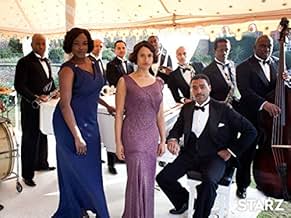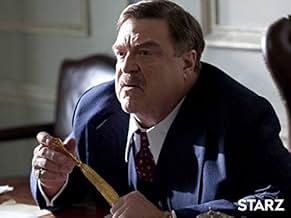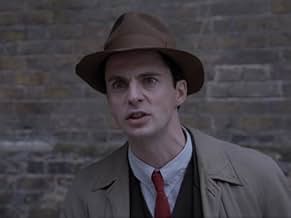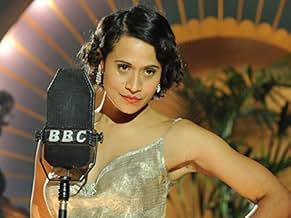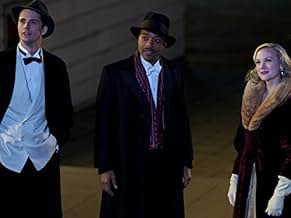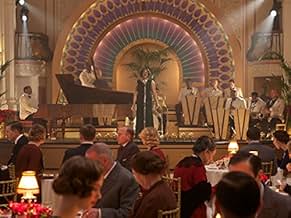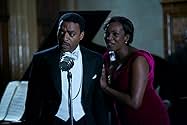ÉVALUATION IMDb
7,4/10
2,9 k
MA NOTE
Ajouter une intrigue dans votre langueSet in the 1930s, a black Jazz band rises in fame and popularity while becoming entangled in an intricate web of intrigue, mystery and suspense with the elite of London society.Set in the 1930s, a black Jazz band rises in fame and popularity while becoming entangled in an intricate web of intrigue, mystery and suspense with the elite of London society.Set in the 1930s, a black Jazz band rises in fame and popularity while becoming entangled in an intricate web of intrigue, mystery and suspense with the elite of London society.
- Nommé pour 1 prix Primetime Emmy
- 5 victoires et 16 nominations au total
Parcourir les épisodes
Avis en vedette
While this makes every effort to appear genuine to the period, it is a superficial experience. The realization comes in the third episode when Lady Cremone (Bisset) says of a party that it will be "fun". Anyone who has read Mitford or Waugh, and Gibbons in "Cold Comfort Farm", knows that 'fun' was a banished adjective among people of that class in that period. It's something that the writer ought to know.
And while the set design and costumes and overall production is glossy it's like a fashion shoot. That fact comes out in the lack of story and drama - nothing much happens and very slowly for a long time. It has a contrived and much smaller stamp to it. Certainly, it does not justify its time or structure. It might have been done much better in half the time.
The music which ought to be central is not and seems of a decade later; in arrangement, style and solo voicing, unconnected to the early 1930s, false when matched against recordings of that time.
As to the characters. They are standard TV fare, but only half-formed. They say things as ciphers in some mimicry of what real characters might have said in that period.
And while the set design and costumes and overall production is glossy it's like a fashion shoot. That fact comes out in the lack of story and drama - nothing much happens and very slowly for a long time. It has a contrived and much smaller stamp to it. Certainly, it does not justify its time or structure. It might have been done much better in half the time.
The music which ought to be central is not and seems of a decade later; in arrangement, style and solo voicing, unconnected to the early 1930s, false when matched against recordings of that time.
As to the characters. They are standard TV fare, but only half-formed. They say things as ciphers in some mimicry of what real characters might have said in that period.
Cannot understand the current rating of this outstanding drama. The story, set over a few weeks in 1933, follows a talented black leader of a jazz band as he tries to get his band established in the London club and hotel scene. He soon finds he is meeting with royalty but that something dark is also going on.
Dancing on the Edge explores the slimy corruption of real evil as royalty, masonry, bigotry and sensuality all combine to provide a very particular view of the upper reaches of British Society.
The production values are excellent, and the 1930's are recreated in remarkable detail. The acting is uniformly excellent, with Chiwetell Ejiofor providing a compelling performance of a man caught up in circumstances spinning beyond his control.
Highly recommended as BBC drama at its best.
Dancing on the Edge explores the slimy corruption of real evil as royalty, masonry, bigotry and sensuality all combine to provide a very particular view of the upper reaches of British Society.
The production values are excellent, and the 1930's are recreated in remarkable detail. The acting is uniformly excellent, with Chiwetell Ejiofor providing a compelling performance of a man caught up in circumstances spinning beyond his control.
Highly recommended as BBC drama at its best.
A clever story with enough intrigue to keep it exciting. The characters are all very interesting and their chemistry works well together.
Stanley writes and edits a local music rag and hears Louis Lester's band in a local dive. He decides to help them become successful and succeeds.
I wouldn't read the blurbs here accompanying each episode because they describe exactly what happens in that particular episode.
The production values, camera work, sets, costumes, make-up and hair are all great and authentic. There is just the right balance between the drama and the music.
They don't get too bogged down with the politics of "negro" prejudice which is refreshing. Yet we are always aware of it in the background.
My only disappointment was I felt the ending of Episode 5 was extremely rushed with a lack of the usual explanation and depth.
I assumed it was the final episode until I saw Episode 6 listed in the TV guide for tonight.
The Interview was something Stanley always wanted but I found the episode boring and superfluous especially since it wasn't the interview I was expecting. We didn't need this companion piece. They would have been better spending more time on the the end of the series although I think Stanley left us with a wimpy cliffhanger for a potential Season 2.
It's almost as if they ran out of funding, time or backing and several of the main stars left before the end of Episode 5. Episode 6 was improvised and didn't make any sense because Stanley obviously had been gathering interview material from the start.
Stanley writes and edits a local music rag and hears Louis Lester's band in a local dive. He decides to help them become successful and succeeds.
I wouldn't read the blurbs here accompanying each episode because they describe exactly what happens in that particular episode.
The production values, camera work, sets, costumes, make-up and hair are all great and authentic. There is just the right balance between the drama and the music.
They don't get too bogged down with the politics of "negro" prejudice which is refreshing. Yet we are always aware of it in the background.
My only disappointment was I felt the ending of Episode 5 was extremely rushed with a lack of the usual explanation and depth.
I assumed it was the final episode until I saw Episode 6 listed in the TV guide for tonight.
The Interview was something Stanley always wanted but I found the episode boring and superfluous especially since it wasn't the interview I was expecting. We didn't need this companion piece. They would have been better spending more time on the the end of the series although I think Stanley left us with a wimpy cliffhanger for a potential Season 2.
It's almost as if they ran out of funding, time or backing and several of the main stars left before the end of Episode 5. Episode 6 was improvised and didn't make any sense because Stanley obviously had been gathering interview material from the start.
Based on a hitherto undiscovered aspect of British history, DANCING ON THE EDGE tells of the fortunes of an African-Caribbean jazz band in 1930s upper-class British society. Louis Lester serves an apprenticeship in the United States, then takes London by storm with the help of talented singers Jessie and Carla. Initially managed by Wesley, who drives a hard bargain but manages to offend just about everyone, the band is eventually guided by white fixer Stanley, who just so happens to run one of London's leading music papers, a rival to the much better- known "Melody Maker." Poliakoff has a fascinating story to tell of a basically racist society that nonetheless embraces the Louis Lester jazz band, which provides the kind of music than no one has ever heard before. The band are so successful that they even attract the interest of the Prince of Wales (the future King Edward VIII). At the same time polite society has a seamy underbelly; if anyone dares to question the idea of white supremacy, then they are summarily dealt with. This rule applies to white and nonwhite people alike. The television series attracted mixed reviews on its premiere in February and March 2013; after having read Poliakoff's excellent screenplay, I am rather nonplussed as to why DANCING ON THE EDGE generated this kind of reaction.
Firstly, at the time of writing (16 September 2013) the information for this on the main page is incorrect. It says this film/series is not yet released. However, I've just watched all 5 episodes on DVD (2 DVDs to be precise), plus the extra almost 1 hour "interview" between Stanley and Louis. The DVD release date was March 2013.
Like another reviewer I simply don't understand some of the poor ratings for this film. It was an immaculate production with an excellent cast for, I think, a cracking, well written story. It has style, suspense, humour, sensuality, good looks, great music and, as with so much of Stephen Poliakoff's work, a lot of intelligent dialogue and some fairly long scenes. But that's why I'm a fan of Poliakoff's work - it is literate, well researched and observed, and you have to pay attention. It rewards that attention many time over.
I must say there were some performances that were a revelation to me. Jacqueline Bisset for a start, and the late Mel Smith. But everyone was really outstanding in the parts they played. Joanna Vanderham is astonishingly mature well beyond her years (19 or 20 years old during the production) and is destined I feel to be a great actress. One cannot comment on this production without mentioning the singers - 2 established actresses who had never sung in public, in theatre, TV or on film before. They did their own singing and were amazingly good.
Like another reviewer I simply don't understand some of the poor ratings for this film. It was an immaculate production with an excellent cast for, I think, a cracking, well written story. It has style, suspense, humour, sensuality, good looks, great music and, as with so much of Stephen Poliakoff's work, a lot of intelligent dialogue and some fairly long scenes. But that's why I'm a fan of Poliakoff's work - it is literate, well researched and observed, and you have to pay attention. It rewards that attention many time over.
I must say there were some performances that were a revelation to me. Jacqueline Bisset for a start, and the late Mel Smith. But everyone was really outstanding in the parts they played. Joanna Vanderham is astonishingly mature well beyond her years (19 or 20 years old during the production) and is destined I feel to be a great actress. One cannot comment on this production without mentioning the singers - 2 established actresses who had never sung in public, in theatre, TV or on film before. They did their own singing and were amazingly good.
Le saviez-vous
- AnecdotesJenna Coleman and Tom Hughes would go on to star together as Queen Victoria and Prince Albert in the ITV period drama Victoria (2016).
- GaffesThe musical style of Louis Lester's band, and especially the vocal styles of his singers and the sorts of songs they perform, are typical of the 1950's, not the 1930's.
- ConnexionsFeatured in The Wright Stuff: Episode #18.20 (2013)
Meilleurs choix
Connectez-vous pour évaluer et surveiller les recommandations personnalisées
- How many seasons does Dancing on the Edge have?Propulsé par Alexa
Détails
- Date de sortie
- Pays d’origine
- Langue
- Aussi connu sous le nom de
- 邊緣之舞
- Lieux de tournage
- Severn Valley Railway, Shropshire, Angleterre, Royaume-Uni(Folkestone and South Bromley stations)
- sociétés de production
- Consultez plus de crédits d'entreprise sur IMDbPro
Contribuer à cette page
Suggérer une modification ou ajouter du contenu manquant




